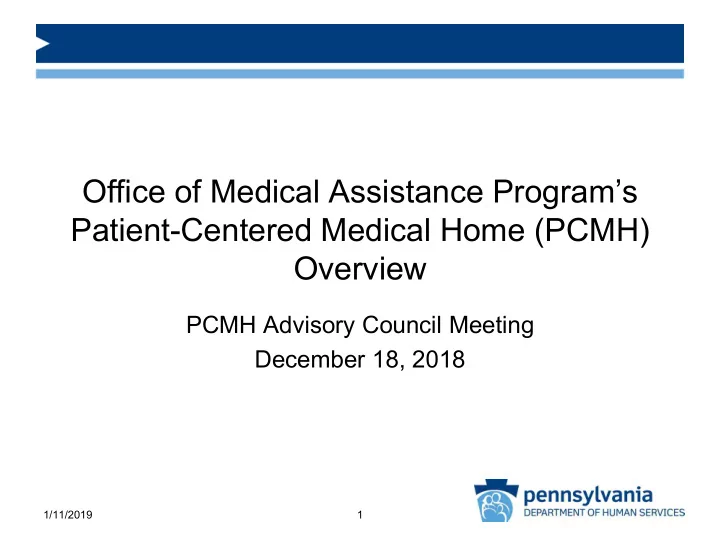

Office of Medical Assistance Program’s Patient-Centered Medical Home (PCMH) Overview PCMH Advisory Council Meeting December 18, 2018 1/11/2019 1
PCMH Advisory Council Agenda 1. Welcome and Introductions 09:00 – 09:05 2. Progress Reports a. PCMH 09:05 – 09:10 b. COEs 09:10 – 09:20 c. CCBHCs 09:20 – 09:30 d. Medication Therapy Management 09:30 – 09:40 e. Telemedicine 09:40 – 09:50 3. Next Steps 09:50 -- 10:00 1/11/2019 2
PCMH Changes • Calendar Year 2019 – Will complete a Social Determinants of Health assessment using a Nationally recognized tool and submit ICD-10 diagnostic codes for all patients – Will educate and disclose to patients through low-literacy appropriate material the practice is a PCMH that has a community-based care management team available to help patients manage complex care needs – The PH-MCO must work towards developing a value-based arrangement with Person-Centered Ambulatory Intensive Care Centers (PC-AICCs) in each zone they operate, unless the PH- MCO demonstrates to OMAP’s satisfaction that the PH-MCO is not able to reach an agreement with the PC-AICC. 1/11/2019 3
PCMH Reporting and Data • Operations Report 19 is an annual report with mandated quarterly updates • As of June 30, 2018 . . . – The MCOs have identified 1,111 unique PCMH practices; – 636,302 Medicaid members are being served by those PCMH providers; – 31,087 of those members are in the top 5% of medical costs; – 76,584 of those members have been diagnosed with a Serious Persistent Mental Illness; and – $10,834,870 have been paid to the PCMH practices. 1/11/2019 4
Centers of Excellence (OUD) • Maintaining a sense of urgency and placing emphasis on continued efforts to combat the opioid crisis remains a top priority for DHS • The 45 COEs across the state provide treatment that is team- based and whole-person focused, with a goal of integrating substance use disorder treatment, behavioral health, and primary care for Medicaid enrollees. Prior to these centers, as few as 48 percent of Medicaid patients diagnosed with opioid use disorder were receiving treatment. Of those, only 33 percent remained engaged in treatment for more than 30 days. Today, more than 70 percent receive treatment after being diagnosed with an opioid use disorder and 62 percent remain in treatment for more than 30 days. 1/11/2019 5
Centers of Excellence (OUD) As of July 31, 2018: ― 16,235 unique individuals with OUD have been in contact with a COE; ― 14,861 unique individuals had a level of care assessment completed; ― 14,379 unique individuals initiated treatment ; 1/11/2019 6
Certified Community Behavioral Health Clinics • Key Points – Two-year demonstration • First year concluded • Second year 7-1-18 to 6-30-19 Performance Metrics (1 st year) – • Clinics are submitting their first year results to SAMHSA by 3-31-19 • The state is submitting their first year measurement results to SAMHSA by 6-30-19 1/11/2019 7
Certified Community Behavioral Health Clinics The NINE CORE CCBHC Services • Crisis mental health services • Screening, assessment, and diagnosis, including risk assessment • Patient-centered treatment planning • Outpatient mental health and substance use services • Outpatient clinic primary care screening and monitoring of key health indicators and health risk • Targeted case management • Psychiatric rehabilitation services • Peer support and counselor services and family supports • Community-based mental health care for members of the armed forces and veterans In Demonstration Year 2 Q1, all CCBHC Clinic Locations (7) exceeded their previous year’s quarterly result in the delivery of at least one of the above core services 1/11/2019 8
CCBHC (continued) Increasing access and participation in CCBHC services: • Screening, assessment, and diagnosis, including risk assessment – Average number of days from first contact to risk screens = 5.1 days – 90.3% of CCBHC members have evaluations done within 10 business days – 90% of CCBHC members with a result of a (+) depression screening have a documented follow-up plan in their record the same day • Outpatient mental health and substance use services – 6/7 CCBHC sites met or exceeded their quarterly goal in the number of members receiving Drug & Alcohol Outpatient Treatment services 1/11/2019 9
CCBHC (continued) Increasing quality of services-- • Peer support and counselor services and family supports – The Peer Support Services average rate was 30.4 per 100 CCBHC members provided in the first quarter of the second year – All CCBHCs are using Evidenced Based Practices (EBPs) with some differences in the EBPs used based on the needs assessment done prior to the start of the grant. – 7/7 CCBHC clinic locations are using the following EBPs: • Cognitive Behavioral Therapy • Trauma Focused Interventions • Medication Assisted Treatment * – For MAT to be reported as an EBP, the individual must be also receiving D & A counseling 1/11/2019 10
Medication Therapy Management (MTM) • DHS focus remains on medication adherence for diabetes, HTN, asthma, HIV, Hepatitis C, and antipsychotic medications • MTM programs are on track to exceed the number of members impacted in 2017 operations • Some MCOs have pharmacists internally conducting outreach, but many have embedded them in practices and some have initiated retail pharmacy partnerships • Pharmacists are responsible for: performing comprehensive medication therapy reviews, identifying medication-related issues, addressing gaps in care with both the member and provider, and counseling members on medication use 1/11/2019 11
Telemedicine • DHS is still strongly encouraging use of Telemedicine • Data for most recent operations period still being extracted 1/11/2019 12
Questions? 1/11/2019 13
Contact Information • Dr. David Kelley, OMAP Chief Medical Officer c-dakelley@pa.gov 717.787.1870 • Michele Robison, Director OMAP Division of Quality and Special Needs Coordination, OMAP mirobison@pa.gov 717.772.6169 • Nancy Stadler, Quality Management Director, OMHSAS nstadler@pa.gov 717.346.1261 1/11/2019 14
Recommend
More recommend